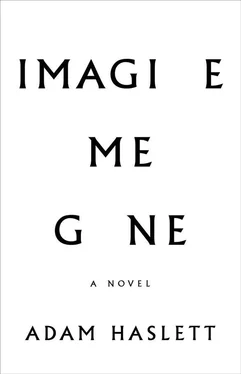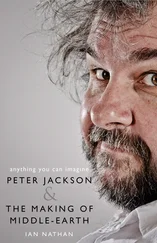And, in this house, the keeper is Jack.
Now some of you might wonder:
Who is Jack, and what is it that Jack does?
Jack is the one who gives you the power to jack your body.
Jack is the one who gives you the power to do the snake.
Jack is the one who gives you the key to the wiggly world.
Or words to that effect. Which might leave you with the impression that I danced. In fact, I never did. After the annihilation of love, I still consider the dance floor the best cure for individualism. But if I’m honest, I can say this only from a certain remove, because I was never able to pick up that key to the wiggly world. The music shook my chest and slapped my face, but I could only sway my head, standing at the edge of the pool, watching the deep end throb. My mother, who finds many things to be a pity, found this a pity. Wouldn’t you enjoy it? she asked, plaintively, hoping as always for the absolution of a remedy. She might as well have asked why I didn’t swim the English Channel. Where my mind goes, my body has never followed.
I didn’t want to leave Britain. Things made sense there for a couple of years, living above the vegetable shop with Simon out in Manor Park with no central heat and the fetid kitchen. I didn’t mind the bus ride to the station past all the depressing little terraced houses with their chintz curtains and grubby hedges, or the overground to Liverpool Street through the blackened warehouses, or the long night buses home after the clubs let out, with the yobs’ vomit streaking under the seats. I was invincibly dressed, after all. Plus, no one asked personal questions. Not even Simon. Mom could send postcards mentioning the upcoming anniversary of my matriculation to nursery school in Battersea, asking if I’d been by the old building, but her wistful calendrics were an ocean away. If it hadn’t been for my shitty exam results I might have gotten into Goldsmiths or Bristol at the beginning of my sojourn, and stayed on. But higher education was a class necessity, and as it happened there were things that I wanted to study. So after putting it off to stay a second year in London, I applied to American colleges. Alas, grade inflation hadn’t reached the UK, and American admissions officers took a dim view of my comprehensive-school Bs. I ended up with six rejections and a job at a bakery in Walcott. After ten months living with my mother and Alec in the house, a time now blessedly voided from my memory, I got off the wait list and into Boston College.
In London, those who didn’t make it past the club doors may not have worn Vivienne Westwood, but most had at least heard of her. They read NME . They read i-D . It was generally understood that music and rigor weren’t unrelated. But not so much at BC. Well-cut linen just didn’t have the same profile. More Led Zeppelin. More Michelob. My work-study job in the rec room drained my serotonin faster than a producer snorts coke. To say nothing of my roommate from Westborough, a “tool” dressed most days in stone-washed jeans and a Guns N’ Roses wifebeater, with whom I was forcibly housed in a sub-brutalist tower sided with gravel. He hadn’t read Celan or Hardy. Death in Venice or Middlemarch . Contemplating his interior life was like staring at a velvet knockoff of an Agnes Martin painting. You needed dental work before long.
What it turned out the place did have, however, was a kick-ass radio station, run chiefly by adult aficionados who had nothing to do with the undergraduate rabble. I managed to talk my way into a weekday two to four a.m. slot. This was at the dawn of techno (at least in Detroit). The listening public, i.e., the dozen or so people who tuned in to my show, needed acclimation to something like Derrick May’s oracular “Strings of Life,” a seven-minute syncopated piano riff looped over a barrage of pop synth and high hats kicking at 128 bpm. Putting this revolution in context required playing songs that most straight musicheads — indulging at that time in the Beastie Boys — considered fey to the hilt, like, say, Ultravox’s “Vienna.” Electronic music has long suffered this prejudice in favor of the four-piece band and the lead singer. As if to break up that nuclear family of rock was to burn the flag. But if we can’t wring spirit from the technical at this late stage, we might as well just donate our bodies to science and get it over with. The machines have to be made to matter. Not on their terms. On ours. They have to be worked back into human longing. And that’s what Atkins, May, Saunderson, and the others were doing. Their pastures weren’t the Lake District or Woodstock but the darkened basements of suburban Michigan.
After a couple of weeks, people began calling the station and asking, What is this stuff? The future, I told them, it’s the future. Listen and be thankful. Not to me, or some genius artist hero, but to the scene producing the sound — the collective witness to life in the shadow of the faded industrial base. Mostly they just wanted to know where they could get their hands on the vinyl so they could start spinning it.
It’s hard to say exactly why I dropped out the fall of my junior year. The architecture obviously wasn’t helping. Nor was my third roommate, a Zionist Patriots fanatic who’d failed to get into Brandeis. The vicious tedium of classes with jocks. A general brownout. Cement in the limbs. I’ve since read about Norwegian reindeer that simply stop moving in winter; they call it arctic resignation. The added blight being that the only place I had to resign to was the house from which I’d fled for the UK in the first place, the house I’d already been forced to retreat to once before. My mother was something of a Norwegian reindeer herself during this period, still trudging back and forth to her job at the Walcott library that she’d begun the winter after my father died. There was a low metabolic rate all around. At least the bakery took me back. I walked there at five most mornings to put the bread and pastry in the ovens. As far as employment history goes, this developed into something of a bright spot. Because I was the first to arrive, I was able to commandeer the kitchen boom box and before long had salvaged several local high school Deadheads. One went so far as to shed his tie-dyes and sweats for pleatless pants and used button-downs. I was at least appreciated.
Because I never told the station manager that I’d dropped out, I was able to keep my radio show, and that January I noticed a schedule change announcing the slot after mine would now feature ska and early dub. Naturally, my curiosity was piqued. What DJ had come forward to fill the only spot deader than my own with grooves that demonstrated such an advanced sense of where dance music on both sides of the Atlantic was headed?
I first saw Caleigh through the glass of the booth. She was hefting a crate of twelve-inches across the lounge dressed in an oversize black turtleneck, baggy purple cords, and black boots, a getup which, properly fitted, wouldn’t have been out of place in London, 1965, or Oakland a decade later, but which on her looked like a thrift-shop effort to obscure how slender she was. She was tall too, nearly six feet, but seemed keen to hide the fact, walking with her shoulders hunched and her head dipped, as though trying to move as invisibly as possible through the room. She wore no makeup or jewelry and had her hair pulled back flat off her high forehead. None of it was enough to disguise her beauty. That she would try apologizing for it only lifted it out of the realm of mere physical chance into a kind of moral grace.
I put on an extra-long final track and came out of the booth to ask if she needed help carrying her records in. She made no response, as if she weren’t the person to ask. I gestured toward one of the crates at her feet; she didn’t protest. The plastic grips were still warm from the touch of her fingers. “I love early dub,” I said. “You can get lost in it.” She nodded, looking straight at me for the first time, for only a split second, her enormous catlike eyes driving stakes through my feet into the carpet like a Roman soldier nailing a thief to a cross. When a half smile lit her face, and she said, “Yeah, I guess you can,” there seemed nothing left but the question of where we would spend the rest of our lives together.
Читать дальше












